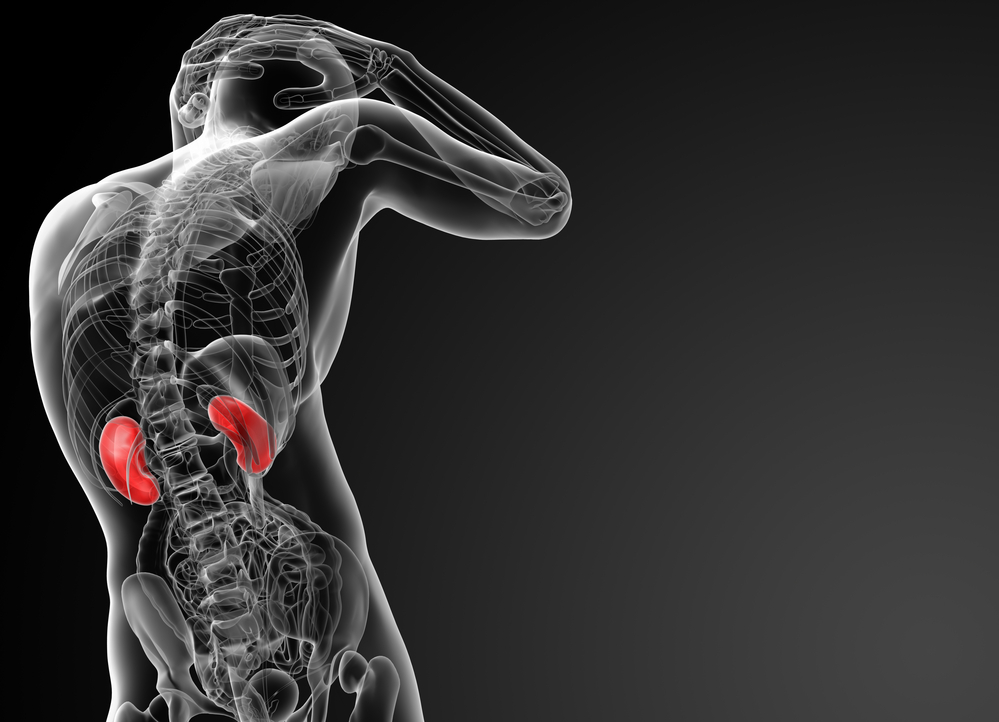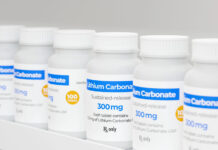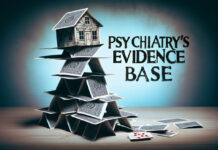Lithium is commonly prescribed to people diagnosed with bipolar disorder. The drug is often continued indefinitely as a “maintenance” treatment because it is theorized to have a preventive effect as a “mood stabilizer.” However, it requires constant monitoring because lithium toxicity can damage several body systems and even lead to death.
Now, a new study has demonstrated that lithium use causes chronic kidney disease at an increased rate, particularly in those who used the drug long-term.
“Patients treated with lithium are at increased risk of chronic kidney disease after long-term exposure,” the researchers write.
The researchers note that more than half of those who begin taking lithium discontinue the drug because of its adverse effects. Lithium levels must be measured every three to six months because the drug can accumulate in the brain and cause permanent brain damage (“neural toxicity”). In addition, thyroid damage is common, with those taking lithium about six times more likely to have hypothyroidism than the general population. Another concern of note is the risk of severe kidney damage. About 20% of those taking lithium experience nephrogenic diabetes insipidus, and, in some cases, the kidney damage may be irreversible.
The current study was published in the top-tier psychiatric journal Lancet Psychiatry, and the research was led by Filip Fransson at Umeå University, Sweden.
 The researchers measured the estimated glomerular filtration rate (eGFR), which is the amount of blood the kidneys are able to cleanse within a given time frame. As kidney function worsens, the GFR decreases (since the kidneys work harder and slower to cleanse the same amount of blood).
The researchers measured the estimated glomerular filtration rate (eGFR), which is the amount of blood the kidneys are able to cleanse within a given time frame. As kidney function worsens, the GFR decreases (since the kidneys work harder and slower to cleanse the same amount of blood).
The data came from two sources: Lithium—Study into Effects and Side-effects (LiSIE) and Northern Sweden WHO Monitoring of Trends and Determinants in Cardiovascular Disease (MONICA). LiSIE is a large cohort study of patients with diagnoses of bipolar disorder or schizoaffective disorder, designed to assess lithium’s efficacy and adverse effects. MONICA is a survey designed to assess the heart health of a representative sample of the Swedish population. In total, the study included data from 2,334 patients.
When researchers compared people with the same diagnoses (bipolar disorder and schizoaffective disorder), those who took lithium for more than ten years experienced significantly more decline in kidney function than those who did not take the drug or who took the drug for a shorter period.
Those with a bipolar or schizoaffective disorder diagnosis had the same decline in eGFR as those without the diagnosis. Even those who had used lithium for less than ten years had about the same decline as the control group. All groups experienced a drop of about 0.57 mL/min/1.73 m² every year (which is normal since function declines with age).
However, for every year on lithium, people experienced, on average, an additional 0.54 mL/min/1.73 m² decline in eGFR. By the 10-year point, this was a statistically significant difference.
“We found no significant difference in eGFR decline between patients with bipolar disorder or schizoaffective disorder with no or only short-term lithium use and the reference population,” the researchers write. “The subgroup using lithium for more than 10 years had a significantly steeper decline compared with all other groups, including the reference population.”
Of the 24 patients with an eGFR of less than 45 mL/min/1.73 m² (considered “chronic kidney disease”), 20 had been exposed to lithium. The researchers concluded that lithium was the “main contributing factor” in 10 cases, but it likely contributed (in addition to other factors) for many of the others.
In conclusion, they write:
“All patients treated with lithium should be considered at high risk of kidney complications. Other possible risk factors for chronic kidney disease, such as hypertension, smoking, diabetes, or use of nephrotoxic drugs, should be minimized. Blood pressure should be monitored regularly and hypertension treated assertively. Bodyweight and metabolic parameters should become part of the routine follow-up of patients treated with lithium. Patients on a fast trajectory should be referred to a nephrologist early to rule out other treatable causes of kidney disease. Shared decision-making between nephrologists and psychiatrists is paramount to achieve the best outcome for the individual patient affected.”
This study is of particular note since lithium’s utility as a preventive medicine has recently been called into question. A major meta-analysis of all modern trials of the drug found no evidence that lithium prevented suicide or non-fatal suicidal behaviors. In addition, a recent large RCT of lithium for suicide prevention in veterans was terminated early because the drug was found to be no better than a placebo.
These findings throw a bucket of cold water on the notion, still proposed occasionally today, that lithium should be added to drinking water to prevent suicide.
****
Fransson, F., Werneke, U., Harju, V., Öhlund, L., Lapidoth, J., Jonsson, P. A., . . . & Ott, M. (2022). Kidney function in patients with bipolar disorder with and without lithium treatment compared with the general population in northern Sweden: results from the LiSIE and MONICA cohorts. Lancet Psychiatry, 9, 804-814. (Link)















Psychiatry has its bases covered.
If they can’t kill ya one way, they try another.
Report comment
Lithium is like all the other Psychiatric drugs in that – if it’s taken then it’s going to need to be taken. The patient becomes sick because of the dependency on the drug. Like all the other Psychiatric drugs Lithium leads to an early death.
(I took Lithium for a few years even though I wasn’t even ‘bipolar’. When I stopped taking the drug I developed a ‘high’ personality. But since I was on other drugs anyway there was no point in putting me on more).
Report comment
Sadly, Psychiatrists are taught that as long as the Lithium levels are carefully monitored then there is little chance that Lithium will damage organs however long term this is false since there are a lawsuits against psychiatrists where people are harmed and lose kidney function despite “careful” monitoring.
I wonder how promoters of Lithium like Kay Redfield Jameison are doing based on her claims that Lithium saved her life. Wonder how her brain and other organs are holding up. Don’t hear anything from her in a long time.
Report comment
Lithium has the closest range between “therapeutic” dosage and toxic dosage of any drug in use today. My belief has always been that the basic action of Lithium is to poison you, JUST A LITTLE, but not too much. The long-term kidney damage alone belies their claim that lithium will do no harm at “therapeutic” levels.
Report comment
I was withdrawn off 9 years of drugs by the community Clinic Director (soon-to-be CMO) of Arizona’s Medicaid behavioral health system following a second Neuroleptic Malignant Syndrome, Risperdal nerve damage to my eyes (!), followed by anaphylaxis, just 2 weeks later, caused by a prescriber.
I was severely effed up (again), body & soul.
One of my then on-board drugs was “the least harmful drug”, Lithium, as I fought to stabilize the damages, INCLUDING a subcortical brain lesion. I had reported THAT earlier to an NP, describing the idiosyncratic symptoms that even after 9 years of drug pollution, was new, scary,…. & ignored. Those symptoms clearly pointed to MS or a lesion…caused by antipsychotics. I don’t have MS.
I had taken Lithium twice, both times I had toxic reactions to what ‘they’ said were low range doses…so it was “impossible” to blame lithium. I was angrily told to stop saying “toxic”…as I drooled, staggering down the hall, trailing my hand on the wall for guidance. My head lolled to
the left side, & I gulped for breath like a goldfish….yet the prescriber ‘wasn’t quite sure’ and called an observer for a second opinion.
Later, thru the immediate chaos & ‘fog of war’ in my poor brain & body, the CMO was firm & insistent that I stop the Lithium ASAP. He told me about a client who stayed on it, requiring dialysis. Ironically, I was reluctant to do it, so afraid of additional, immediate bad reactions piling on & speeding up my inevitable, pending death…in an adult diaper.
I mean, at that point I only had 2 hours of upright function a day…for 5 months. I wasn’t looking for additional challenges…just what was in front of me.
This was 2013, ten years ago. I was deep in damage control, heard him, put it on my long priority list. When I finally titrated & stopped, I was relieved but I never stopped worrying.
After completely withdrawing off of everything…..& having their lifetime sentence removed (bipolar-for-life) in writing…..
I watch my GFR numbers & kidney/liver functions like a hawk. I have my heart inspected annually, as lithium caused morning palpitations…& Geodon=bradycardia and hospitalization.. My current GFR (at 71 yo is 80-85)…it’s hard to stop worrying…as I plan to live decades more.
After all, the amount of Depakote poured down my throat also delivered terrifying kidney labs.
I have sympathy-for-the-Devil/OOPS,…industry….burdened with this depressing science and damning facts.
It must be hard for you.
Report comment
I am baffled to see an article on lithium toxicity, which, despite being recent, makes no mention of the alternative forms of lithium. Here’s an August 2021 U of Saskatchewan article on alternatives: “Lithium orotate: A superior option for lithium therapy?”
https://www.ncbi.nlm.nih.gov/pmc/articles/PMC8413749/
Lithium is in our diet. If some lithium compound is being called a “drug”, it sounds like it’s the wrong compound.
Report comment
The amount of lithium used as “treatment” for “bipolar disorder” is many, many times the daily required dosage for nutrition. One estimate I just read suggests that one mg of Lithium a day is sufficient. Another measured the amount in micrograms (thousandths of a gram). A “therapeutic dose” is defined as 300-600 mg three times daily, or 900-1800 mg, one to two THOUSAND times the needed amounts. No one will specify what actual daily dosage of Lithium will kill you, but it is recognized that the “therapeutic” dosage and the toxic dosage of lithium are so close together that regular blood tests (once a week or so to start with) have to be done to ensure you are not receiving a toxic dosage.
Lithium at high dosages is most definitely a drug. And a potentially deadly one. For those who don’t happen to die as a result of overt toxicity, Lithium at “therapeutic dosages” is known to be very hard on the kidneys, and can lead to kidney failure.
https://www.kidney.org/atoz/content/lithium#:~:text=Lithium%20may%20cause%20problems%20with,you%20have%20been%20taking%20lithium.
Report comment
My mom sadly no longer with me was put on
Lithium for bi polar
Damaged he kidneys
She died they never gave her dyallisus treatment
The hospital doctor failed to monitor
Blood level
Report comment
That is both sad and enraging!
Report comment